(ARTICLE 19/IFEX) – The following is a 3 July 2000 ARTICLE 19 press release: SRI LANKAN CENSORSHIP REGULATION STILL IN PLACE DESPITE COURT RULING ARTICLE 19 today welcomed the Sri Lankan Supreme Court’s ruling of Friday 30 June, which held that the state censor was not properly appointed and therefore had no authority to close […]
(ARTICLE 19/IFEX) – The following is a 3 July 2000 ARTICLE 19 press release:
SRI LANKAN CENSORSHIP REGULATION STILL IN PLACE DESPITE COURT RULING
ARTICLE 19 today welcomed the Sri Lankan Supreme Court’s ruling of Friday 30 June, which held that the state censor was not properly appointed and therefore had no authority to close down The Sunday Leader and other newspapers. However, the freedom of expression organisation today pointed out that Regulation 14 of May 2000, under which the bans were implemented, remains in place and it would be a relatively simple matter for another censor to be appointed. (1)
Toby Mendel, Head of ARTICLE 19’s Law Programme said:
“We welcome this decision as an important step towards protecting freedom of expression in Sri Lanka. (2) ARTICLE 19 hopes that the Supreme Court will build on its judgment in this case by ruling as unconstitutional Regulation 14, which introduced censorship, and led to the newspapers being banned for publishing what we view as politically sensitive material, rather than causing direct harm to national security interests.” (3)
In a brief submitted to the Sri Lankan Supreme Court in connection with last week’s case, ARTICLE 19 argued that while states may impose limited restrictions on freedom of expression to safeguard national security and public order, such restrictions are only legitimate if they meet a strict test established under international law. This test requires that: any restrictions must be clearly and narrowly drawn and be applied by bodies which are independent of governmental or political influence; and that there is a sufficient nexus between the proscribed expression and the risk of harm to national security or public order. (4)
Notes For Editors
1. In May, ARTICLE 19 called on the government to revoke the regulations (see www.article19.org/docimages/496.htm).
2. The judgment relates to the censor’s warning to The Sunday Leader on the basis that a photograph of an opposition rally and “other news items” contravened Regulation 14. The paper had also published two almost identical cartoons and stories, the only difference being that one targeted the opposition UNP party while the other targeted the governing PA party. The former had been approved by the Competent Authority but the latter, although in essence identical, had been completely censored.
3. Regulation 14 is currently the subject of a Constitutional challenge in the Supreme Court.
4. ARTICLE 19’s brief to the Supreme Court argues that Regulation 14 of the Emergency (Miscellaneous Provisions and Powers) Regulation, No. 1 of 2000, both in general and as applied to Leader Publications, breaches international standards and that it is not, as a result, a legitimate restriction on freedom of expression. You can view the brief at
www.article19.org/docimages/600.htm.


